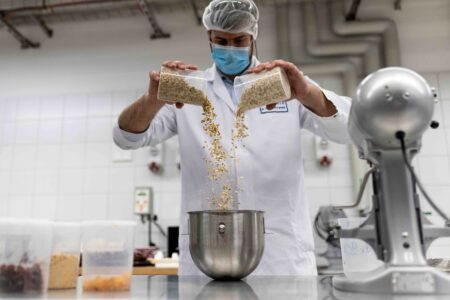Caobisco welcomes EU legislation plans for delivering deforestation-free products including cocoa

Deforestation has increased through a number of sectors including with palm oil and cocoa. Pic: Shutterstock
Caobisco, the European chocolate, biscuit and confectionery trade association, has backed EU plans for regulation on deforestation-free products, including the key cocoa supply chain serving the sweets and snacks sector, reports Neill Barston.
The proposals were first put forward in November of last year, and have gained a wide level of industry support, that have targeted core agricultural supplier nations including Ghana and Ivory Coast, which have suffered extreme loss of forests over the past few decades amid growing commercial pressures on land.
Muriel Korter, director general of Cabisco, welcomed the prospect of the legislation being brought forward, which she believed would have a notable positive impact on the confectionery industries.
She said: “The EU proposal for a Regulation on deforestation-free products is a unique opportunity to bring together public and private actors in the joint mission of tackling global deforestation. Inclusive dialogue and bilateral partnership agreements between the EU and the governments of producer countries, with the support of the industry, are crucial to enhance capacity building at origin and address the root causes of deforestation.”
Furthermore, Caobisco explained the confectionery sector remained committed to ensuring that their products are deforestation-free and to minimising the risk of deforestation and forest degradation to occur in their supply chains.
In its view, the organisation said that EU Regulation should be a part of a smart mix of measures, with both demand-side measures and supply-side measures needed to effectively end global deforestation, building on existing certification schemes and standards, as well as through the setting up of robust national traceability systems in countries of production. Consequently, the trade organisation said it stands ready to keep collaborating with the EU institutions and is looking forward to the next steps of the legislative process.
Notably, it added that its members are already taking steps to mitigate and minimise the risk of deforestation in their supply chains through dedicated programmes- including much-publicised measures such as the Cocoa and Forests initiative put forward by governments in the region working with industry.
However, as Confectionery Production recently noted, research from the Mighty Earth environmental campaign group, found that despite the development of such major sector initiatives in 2017, rates of deforestation in Ghana and Ivory Coast had continued at “near record levels,” which had been worsened amid the impact of the Covid-19 pandemic.
As Caobisco noted, while voluntary initiatives have allowed progress towards deforestation-free supply chains, the challenge of deforestation, forest degradation, and forest conversion remains.
Consequently, the organisation said it urges the EU to ensure coherence and consistency of this Regulation with the other relevant EU initiatives, in particular with the EU proposal for a Corporate Sustainability Due Diligence Directive.
Caobisco added that it is in favour of building on existing certifications and standards and encourages the creation of robust national traceability systems as a mandatory condition for companies to fulfil their due diligence obligations. In its view, existing private initiatives need to be accompanied by harmonised due diligence systems to identify, address and report on risks of deforestation with a view to achieving greater supply chain transparency and traceability.
Furthermore, the organisation asserted that at producer country level, national government-mandated sector-wide traceability and enhanced transparency – through an effective farmer registration system – should be promoted and linked to a verification of minimal standards that uphold environmental sustainability, particularly forest protection. This would help streamline compliance with due diligence requirements. Significantly, the proposed regulation raises questions on how such obligations are implemented.
Key points of detail
In addition, Caobisco raised five key areas of focus for the legislation. This included the need for clear definition of the scope of chocolate imports and exports in relation to any new legislation, as well as the creation of a three-tier benchmarking system aimed at incentivising countries to ensure stronger forest protection and governance.
As regards due diligence, the trade body felt that any such requirements such deliver a level playing field for all involved, and crucially include enhanced traceability measures relating to specific commodities (namely cocoa), to enable deforestation-free checks. In terms of controls, it felt there should be an obligation for authorities to check 15% of products on an annual basis in high risk areas, and 5% in other locations.
Finally, after two years of creating such legislation, additional assessments should be made to extend the scope of the regulations, and the creation of a realistic timeline for businesses to comply with such measures.
Speaking on the proposed EU legislation, Christian Sloth, Forest Legality Manager at Preferred by Nature, a non-profit organisation specialising in land management designed to improve environmental conditions, also recently welcomed the EU legislation. He said: “This is indeed a very ambitious proposal. It has a wider scope, a stronger and clearer definition of responsibility, and more emphasis on data collecting and documentation than any existing regulation or policy in this area. If implemented in its current form and shape, we believe it could reduce EU’s contribution to deforestation significantly.”



